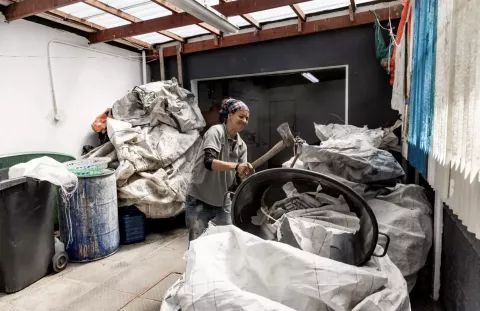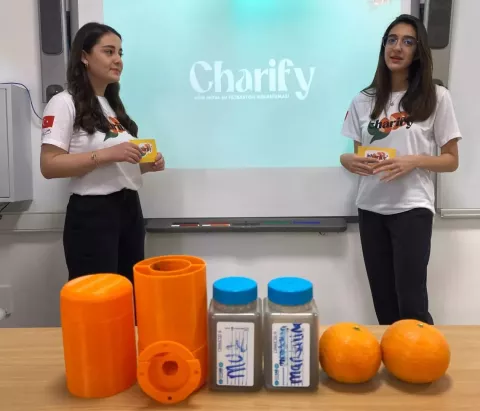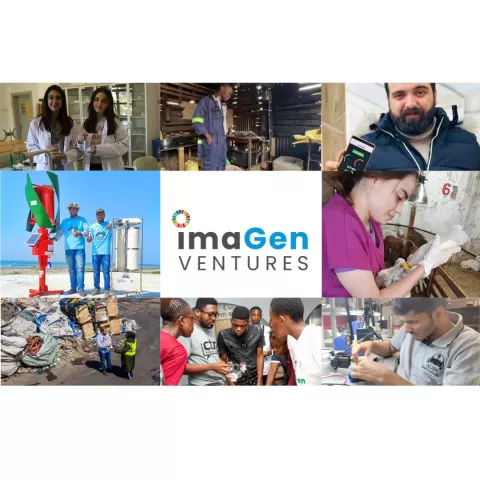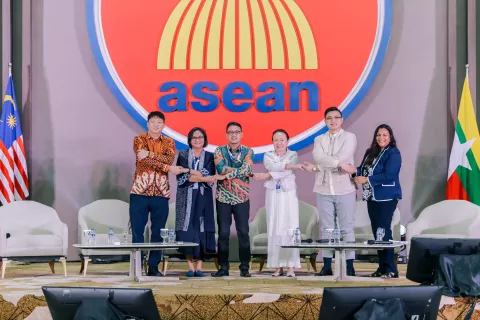GenU Q&A with Rolake Rosiji, Chief Executive Officer of Jobberman
"We need to rethink education and vocational training across Nigeria and Africa. We need an entire mindset shift."
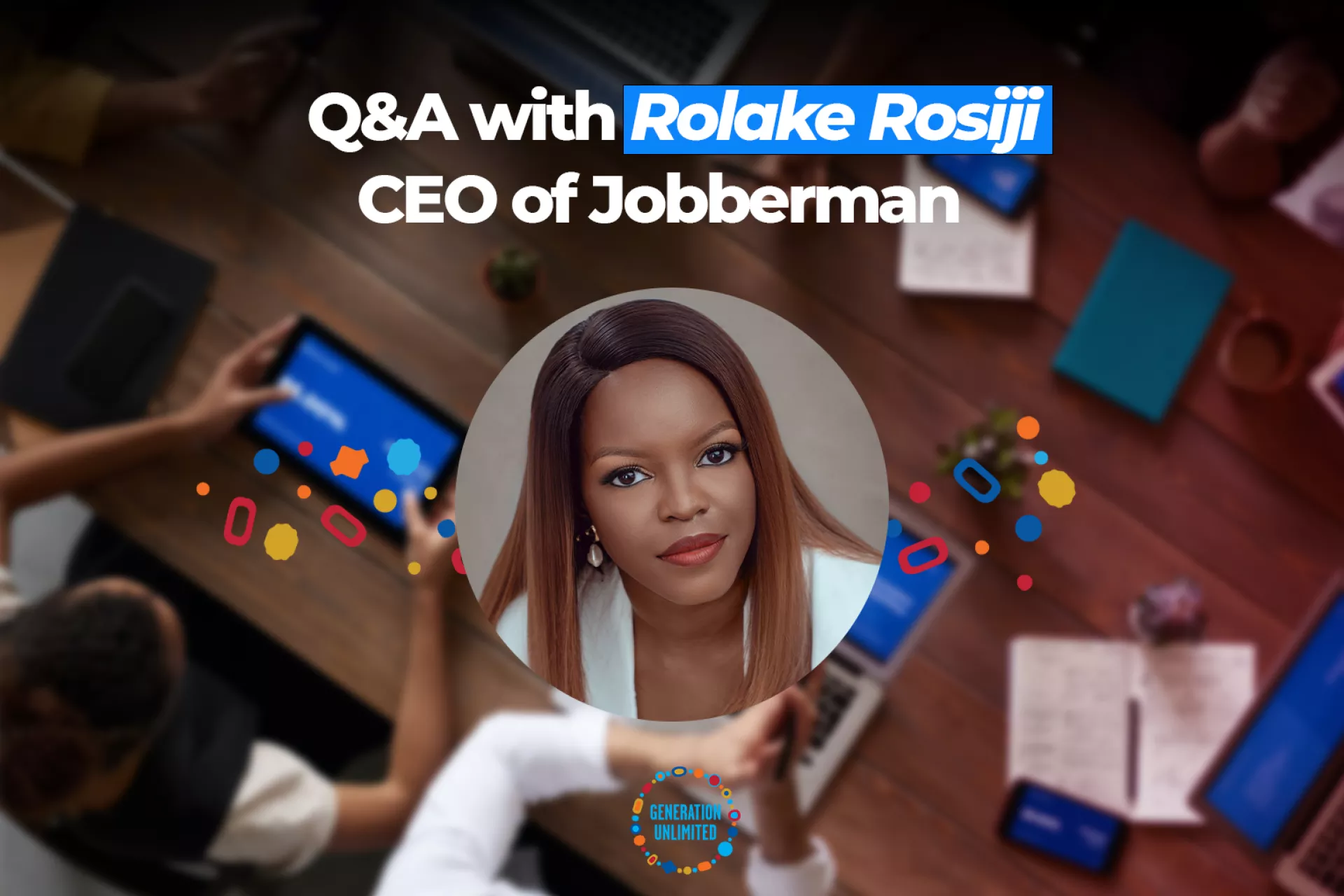
What do you think are the key challenges that stand in the way of young people's employment (In Nigeria, and globally?
I think the main challenges are the obvious mismatch between jobs available and the skills young people have. In many countries, Nigeria included, the curriculum is outdated curriculum – Educational institutions are not prioritizing digital skills. Hence, what is taught in the classroom is not applicable for industry. So, they join the workforce without essential digital skills to transition into the world of work. 450,000 people enter the workforce each month, but 4,704 jobs are created each month. Further, most graduates are studying Medicine, Law, Accounting, Biochemistry, Engineering, Economics, and Architecture, where most of the jobs are in banking, finance, telecoms, and a very large proportion are blue-collar jobs. People should not be ashamed to work with their hands in carpentry, or as a mechanic or in agriculture and farming. We need to work hard to remove this misconception that you can only get a good job if you are a doctor, engineer or lawyer. These are not where the jobs are in Nigeria and we have published a report on how COVID 19 has impacted the Nigeria jobs market and the future of work.
What does it take to solve those challenges?
We need to rethink education and vocational training across Nigeria and Africa. We need an entire mindset shift. Educational institutions, private sector, and government need to collaborate here to ensure that educational goals are linked to desired employment outcomes. We need to work backward from the job market – and then decide what vocational training and university degrees to encourage. We now see a fintech boom in Nigeria, we have become the fintech capital of Africa for venture capital with $120.6 million invested in fintech in Nigeria over the last year alone, 21% of all VC in all Africa. This took years of consistent investment and focus. Can the same be done for Digital skills?
The rise of digitalization, new technologies, and Covid-19 are fundamentally transforming how we conduct business and the type of skills needed in the workforce. Given these imminent labor market changes, how can help young generations prepare for what’s ahead?
Young people have an advantage in social media and can use social media platforms more productively. I encourage youth to use it to showcase their abilities and competences. Writing is a powerful way of doing this – one can use your writing to share your thoughts and engage about issues, ask for help and tell their story in a professional way.
Young people should also be prepared for remote working and be skilled as much as possible in both hard skills and soft skills. Where are hard skills open the door for a job interview, soft skills help you succeed in the interview and retain the job. Research conducted by Harvard University, the Carnegie Foundation and Stanford Research Center concludes that 85% of job success comes from having well‐developed soft and people skills, and only 15% of job success comes from technical skills and knowledge (hard skills). Therefore Jobberman is offering free soft skills training and anyone can access it on our website.
Regarding the specific skills required to master Digital jobs in this new world of remote working, our report on the Digital Skills gap in Nigeria has identified a long list of skills as areas where young people can focus on building in order to get better jobs in this report.
As the brain behind Sub-Saharan Africa's largest online recruitment platform, Jobberman, what role can technology play to tackle youth unemployment and other youth issues?
Technology is the back bone of our business and the central thread to our business model. We are able to use our online platform to connect around 2.7 million job seekers to 70,000 employers using technology. Our applicant tracking system incorporates digital CVs, and advanced search tools reliant on clever algorithms to enable employers to search for the best candidates for open positions. We can get 100s of applicants applying for one job so our algorithms have to effectively narrow down to the best candidates. We are constantly innovating in technology to ensure searches are accurate.
Tech is also the backbone for our online training, and Edtech has been such a gamechanger worldwide. We provide a soft skills course on several platforms including Coursera, Telegram, and Thinkific. It is made more effective by us encouraging each trainee to take a baseline assessment to understand their specific needs and an endline assessment to evaluate is those needs were met by the training. It’s very hard to get people to complete the entire training so one thing we do is offer an Online Certificate to those who pass the endline assessment. Ultimately this training should help young people get a job. Once they are certified, we provide access to job opportunities on our platform. From gig work to part-time positions, freelance and as well as full-time roles.
How did you reach your level of success given the sector’s gender gap? What's your advice to young women and girls?
I’d say the main thing that has worked in my favour is being bold and asking for what I want, and going the extra mile to stand out. I advise young girls not to ever shrink back but to be outspoken and confident in asking for whatever it is they want. To be honest, I learned this many years into my working life and I wish some had told me earlier. Ask for the best projects at work, tell your boss where you want to be in the future and the type of work you need to do to get there, ask for the higher salary, ask for even more than you think you’re worth because that is probably the right figure. As women we tend to underestimate ourselves, I will never forget the day a male colleague shared his salary with me and was so shocked at the disparity between our salaries. He became my advocate in that workplace and then after some time i also began to advocate for myself.
Also go the extra mile to stand out and be truthful with yourself of where you may need improvement. After identifying it, don’t dwell on it anxiously but move quickly to do the right course or get the right experience to give you confidence in that area. Also find a mentor! Think of mentors like your tour guide in the wild park. Without them you might be eaten up by wild animals. This becomes more important, the more senior you get.
Ojoh Aghogho Urowoli (23 years), asks: "Why do most organizations ask young people for job roles and expect them to have 3-5 years’ experience? At 20, I might not have had enough opportunities to get a job because most of the recruiters are asking a lot.
This is a challenge many young people deal with. However if you flip the question round and see it from the employer’s perspective - they have a limited amount of resources to use on employing staff. Therefore they are trying to get the best staff for as little as possible at times.
So your question can now become, how do I stand out as the best candidate for a recruiter with limited resources? Consider an internship to build up your experience and try and experience even whilst they are still in high school or university. Having said this, do try and get a foot in the door in a company where they will nurture you and invest in you.
Gbemisola Ojediran (22 years), asks: How can Jobberman make its opportunities accessible to all Nigerians, especially those that do not have access to the internet and digital literacy?
Great question – we are working on ways to reach people without access to the internet as we know that a large proportion of Nigerians do not have access to the internet and many Nigerians do not have access to smart phones. We are providing physical in-person training to National Youth Service Corps (NYSC) students. We have translated versions of our curriculum in Hausa language and in pigeon English. Added to that our teaching style is such that our examples and case studies are situated within local contexts. We have been able to create women-only training sessions and have recently piloted sessions for people with disabilities.

